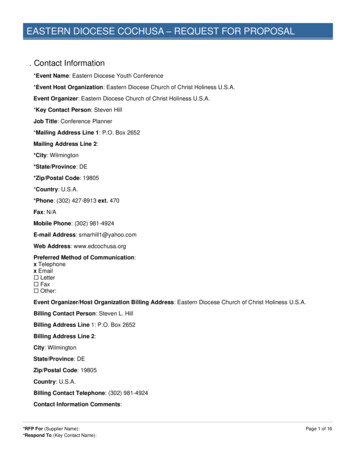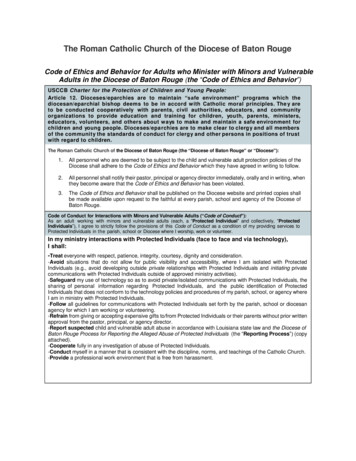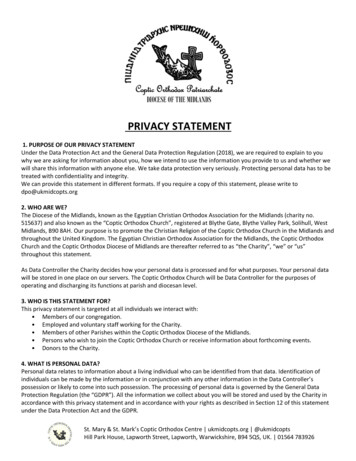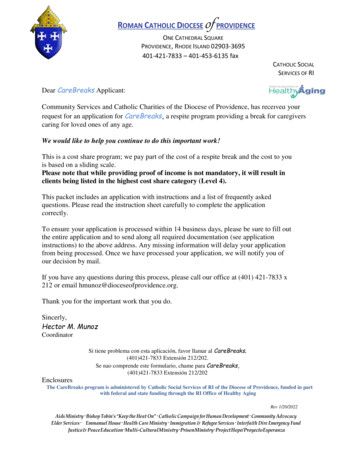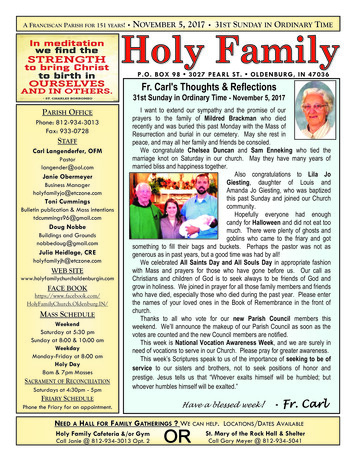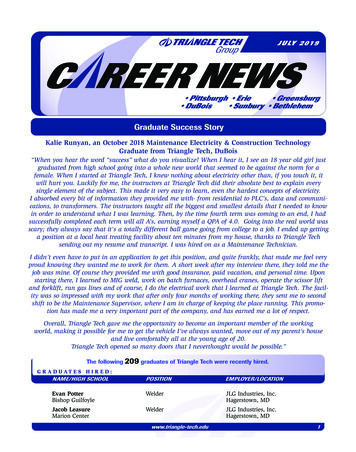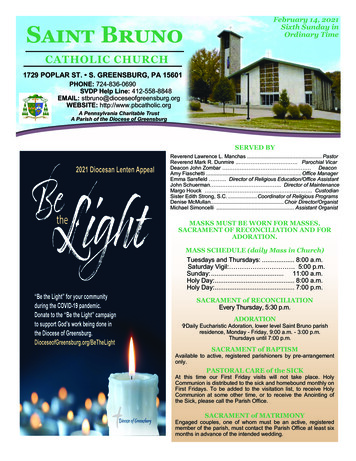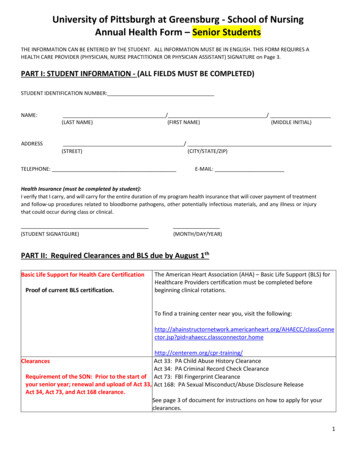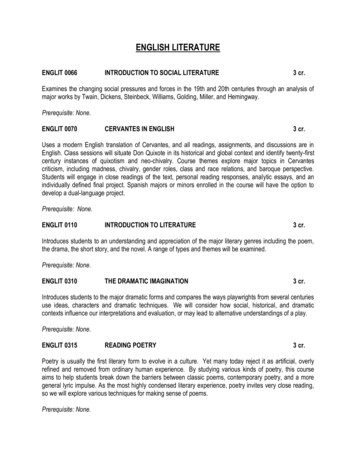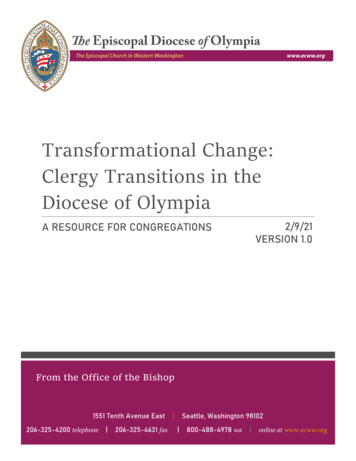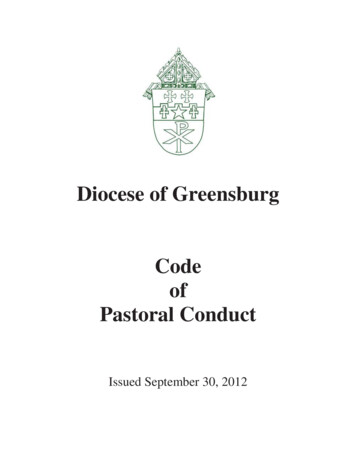
Transcription
Diocese of GreensburgCodeofPastoral ConductIssued September 30, 2012
LawrenceBishop Of GreensburgThe pastoral care of souls is one of the highest priorities of every Bishop. This fundamentalmandate comes directly from Christ himself. As St. Paul writes in his letter to the Philippians; “Ifthere is any encouragement in Christ, any solace in love, any participation in the Spirit, anycompassion and mercy, complete my joy by being of the same mind, with the same love, unitedin heart, thinking one thing. Do nothing out of selfishness or out of vainglory; rather, humblyregard others as more important than yourselves, each looking out not for his own interests, but[also] everyone for those of others. (Philippians 2:1-4) Never is this truer than when I reflect onthe responsibility for the pastoral care of the flock entrusted to me and that I share with you, thepriests, deacons, men and women religious and laity of the Diocese of Greensburg. The sacredtrust that is granted to us to provide holy and healthy ministry to the flock should never bebroken.The protection of those to whom we minister has long been a concern of the Diocese ofGreensburg. In 1985 the document A Policy of the Diocese of Greensburg for Clergy SexualMisconduct was promulgated in the Diocese of Greensburg. This policy was reviewed andrevised in February of 2002. Additionally the Diocese of Greensburg implemented a MinorProtection Policy in 2007 which was revised in 2008. For many years these policies haveeffectively governed our conduct and interactions with all those we serve. Besides providingclear boundaries for general ministerial conduct these policies focus particularly on boundariesin ministry related to both youth and vulnerable adults. Nationally the revised Charter for theProtection of Children and Young People was developed by the Ad Hoc Committee for SexualAbuse of the United States Conference of Catholic Bishops (USCCB). It was approved by thefull body of U.S. Catholic bishops at its June 2005 General Meeting, and this second revisionwas approved at the June 2011 General Meeting.As the Diocesan Bishop, it is my responsibility to ensure that all of those who serve in the nameof the Church do so in a manner that is compliant with all diocesan policies and the NationalCharter. This Code of Pastoral Conduct is designed to be a companion to the guidelines of the
National Charter and to replace both the Minor Protection Policy and the Policy of the Dioceseof Greensburg for Clergy Sexual Misconduct.The Code of Pastoral Conduct for the Diocese of Greensburg clearly sets forth standards andexpectations for all those who act in the name of the Diocese. This document applies to allbishops, priests, deacons, religious and lay members of the Christian faithful who assist inproviding pastoral care in the diocese. Although this code cannot cover every aspect of everycircumstance that one may encounter in the course of Church related work it should be seen asa concise enumeration of expected public and private behavioral standards for those working orvolunteering in the parishes, schools and other entities within the Diocese of Greensburg.As Bishop of the Diocese of Greensburg I am always grateful to God for the magnificent workyou do in serving His people. I know that you join me in making every effort to ensure thateveryone who approaches the Church is treated with respect and dignity. I ask you to see thisCode of Pastoral Conduct as a helpful instrument that will protect both you and those you serveas you go about our shared mission of bringing the love of God to all in our care.
Code of Pastoral Conductfor Church Personnel of the Diocese of GreensburgTable of ContentsLetter from the Diocesan BishopI.Preamble and Definitions*2II.Responsibility3III.Pastoral Standards31. Conduct for Pastoral Counseling and Spiritual Direction32. Confidentiality53. Conduct with Youth64. Sexual Conduct95. Harassment96. Records and Information107. Conflicts of Interest118. Reporting Misconduct129. Administration1210. Church Personnel Well-being1211 Clergy Sexual Misconduct1312. Employment and Volunteer Requirements1513. Preventive Intervention1614. Review and Update Expectations17Appendix:Procedural Guidelines for an Alleged Violation of the CodeAcknowledgement of Receipt of the Code of Pastoral Conduct1819-20*For purposes of this Code of Pastoral Conduct, the term “Church personnel” includes anyperson who performs tasks for the Church under the auspices of the Diocese of Greensburg orone of its parishes or schools. This includes Bishops, Priests, Deacons, Seminarians, ReligiousPersonnel, Pastoral Ministers, Spiritual Counselors, Administrators, Lay Employees, andContract Employees who are employed by the Diocese of Greensburg or any of its parishes orschools together with those Lay Volunteers who provide services to/for the Diocese ofGreensburg or any parish or school within the Diocese.This Code of Pastoral Conduct is based on a model dated March 17, 2003 and provided by the National Catholic Risk Retention Group, Inc. The Diocese ofGreensburg expresses its sincere gratitude to the National Catholic Risk Retention Group, Inc. for its work in providing a model and its willingness to allowthat model to be used as a basis for this Code. The Diocese of Greensburg reserves the right to modify or amend The Code of Pastoral Conduct at any time.
I. PreambleAll Church personnel including, but not limited to: Priests, Deacons, Seminarians, Religious Personnel,Pastoral Ministers, Spiritual Counselors, Administrators, Lay Employees, Lay Volunteers and ContractEmployees in our parishes, schools, programs and organizations must uphold Christian values andconduct. Parents are also encouraged to take an active interest in any and all services and programs inwhich their children are involved in the Diocese. This Code of Pastoral Conduct provides a set ofstandards for conduct either in providing or in supporting the pastoral care of the Christian faithful andall others. The Code does not present an exhaustive list of expectations, standards, or requirements.Rather, this Code accompanies the Universal Law of the Church, civil law, and diocesan policies.Church personnel are to be aware of and committed to all of these norms that govern pastoral conduct.For the purpose of this document, Priests, Deacons, Seminarians, Religious Personnel, PastoralMinisters, Spiritual Counselors, Administrators, Lay Employees, Lay Volunteers and ContractEmployees will be referred to from this point forward as Personnel.This Code of Pastoral Conduct replaces the February 2002 “Policy of the Diocese of Greensburg forClergy Sexual Misconduct,” as well as the “Minor Protection Policy” of the Diocese of Greensburg.ADDITIONAL DEFINITIONS:A Minor is defined as a person under the age of 18.A Young Adult is defined as a person age 18-20. Both a Minor and a Young Adult are defined asYouth.An Adult is defined as a person age 21 or older.A Vulnerable Adult is defined for the purpose of this document as any person over the age of eighteen(18), who, by reason of some mental infirmity has such diminished reasoning or cognitive capabilitiesthat they may be considered the equivalent of a minor child.Allegation: A first person accusation of sexual abuse of a minor brought against church personnel; pastor present, living or deceased, which is reported to the Bishops Delegate through any form ofcommunication including any that are anonymous.Report: A third party accusation of sexual abuse of a minor brought against church personnel;past or present, living or deceased, which is reported to the Bishops Delegate through any form ofcommunication including any that are anonymous.False Allegation/Report: An allegation or report that was proven to be untruthful and fabricated.Implausible: Any allegation or report that could not possibly have occurred under the givencircumstances (e.g., an accusation is made against church personnel who was deceased at the time of thealleged offense). Erroneous information does not necessarily make an allegation/report implausible (e.g.,the church personnel arrived at the parish a year after the alleged abuse, but all of the other facts of thecase are credible and the alleged victim might have mistaken the date).Sexual Abuse or Exploitation: (Legal Definition, Pa. C.S. ss 6303) The employment, use, persuasion,inducement, enticement or coercion of any child to engage in or assist any other person to engage inany sexually explicit conduct, or any simulation of any sexually explicit conduct, for the purpose ofproducing any visual depiction, including photographing, videotaping, computer depicting or filming,of any sexually explicit conduct or the rape, sexual assault, involuntary deviate sexual intercourse,aggravated indecent assault, molestation, incest, indecent exposure, prostitution, statutory sexualassault, or other forms of sexual exploitation of children.2
Child Abuse: (Legal Definition, Pa. C.S. ss 6303) The term "Child Abuse" shall mean any of thefollowing:Any recent act or failure to act by a perpetrator which causes non accidental serious physicalinjury to a child less than 18 years of age.(i)An act or failure to act by a perpetrator which causes non accidental serious mental injury to orsexual abuse or sexual exploitation of a child less than 18 years of age.(ii)Any recent act, failure to act or series of such acts or failures to act by a perpetrator whichcreates an imminent risk of serious physical injury to or sexual abuse or sexual exploitation of a childless than 18 years of age.(iii)Serious physical neglect by a perpetrator constituting a prolonged or repeated lack of supervisionor failure to provide essentials of life, including adequate medical care, which endangers a child's life ordevelopment or impairs the child's functioning.(iv)Child Pornography: Any written, printed, electronic, photographic or other depiction or description ofa minor in a sexually explicit context or any material of any kind that is produced, created or displayedfor the purpose of sexual gratification of adults through the exploitation of minors.II.ResponsibilityThe public and private conduct of Church personnel can inspire and motivate people, but it can alsoscandalize and undermine people's faith. Church personnel are, at all times, to be aware of theresponsibilities that accompany their work. They are to know also that God's goodness and gracesupport them in their ministry. Responsibility for adherence to the Code of Pastoral Conduct rests withthe individual. Church personnel who disregard this Code of Pastoral Conduct will be subject todisciplinary action up to and possibly including dismissal. Corrective action may take various forms from a verbal warning to removal from the ministry - depending on the specific nature andcircumstances of the offense and the extent of the harm. (See Appendix for Procedures)III.Pastoral Standards1.Conduct for Pastoral Counseling and Spiritual DirectionChurch personnel providing pastoral counseling or spiritual direction are to respectthe rights and advance the welfare of each person.Definitions:The definition of Pastoral Counseling as defined by the American Association of Pastoral Counseling:Pastoral Counseling is a unique form of psychotherapy which uses spiritual resources as well aspsychological understanding for healing and growth. It is provided by certified pastoral counselors, whoare not only mental health professionals but who have also had in-depth religious and/or theologicaltraining.The following is the definition of Professional Counseling as defined by the American CounselingAssociation: Professional counseling is the application of mental health, psychological or humandevelopment principles through cognitive, affective, behavioral or systemic intervention strategies thataddress wellness, personal growth, or career development, as well as pathology. (http://counseling.org)3
The Commonwealth of Pennsylvania defines Counseling as: The application of principles and practicesof counseling, mental health, and human development to evaluate and facilitate human growth andadjustment throughout the life span and to prevent and treat mental, emotional or behavioral disordersand associated stresses which interfere with mental health and normal human growth and development(PA Act 136, 1998).The definition of Spiritual Direction is the help or guidance that a person (directee) seeks and another(director) gives over a period of time in the process of growing in a loving relationship with God. Thisprocess unfolds under the continual impulse, inspiration, and action of the Holy Spirit. Spiritualdirection, therefore, involves three persons: the directee, the director, and the Holy Spirit. Spiritualdirection is always done within the context of the Roman Catholic Church's understanding of Scripture,it is connected to the Church’s Sacraments, and conducted by one who is aware of the teaching andguidelines that have protected and fostered a variety of spiritualities over the centuries of the Church'shistory.1.1Church personnel are not to step beyond their competence in counseling or spiritual directionsituations and are to refer those who seek their assistance to other professionals when appropriate.1.2Church personnel are to consider carefully the possible consequences before entering into acounseling or spiritual direction relationship with someone with whom they have a pre-existingrelationship (i.e., employee, professional colleague, friend, or other pre-existing relationship). [SeeSection 7.2.2]1.3Church personnel are not to audiotape or videotape sessions.1.4Church personnel are never to engage in sexual intimacies with the persons they counsel orspiritually direct. This includes consensual and nonconsensual contact, forced physical contact, andinappropriate sexual comments.1.5Church personnel assume the full burden of responsibility for establishing and maintaining clear,appropriate boundaries in all counseling and counseling-related relationships or spiritual direction.1.6Physical contact of any kind (i.e., touching, hugging, and holding) between Church personneland the persons they counsel or spiritually direct can be misconstrued and is to be avoided.1.7Either counseling or spiritual direction sessions are to be conducted in appropriate settings; e.g.,the parish office at appropriate times. Every effort should be made to conduct sessions during normalbusiness hours when other staff are present in the office.1.7.1 No sessions are ever to be conducted in private living quarters.1.7.2 Sessions are not to be held at places or times that would tend to cause confusion about thenature of the relationship for the person being counseled or spiritually directed.1.8Church personnel providing pastoral counseling or spiritual direction are to maintain a log of thetimes and places of sessions with each person being counseled or directed. These sessions should beclearly defined with a set time for the meeting to begin and end. If the Sacrament of Reconciliation isrequested it should be clearly separated from the pastoral counseling or spiritual direction session and,except in an emergency situation, it should take place in the church confessional since theUniversal Law of the Church states that Sacrament of Reconciliation should not be heard outside4
of the confessional. The counselor could also recommend that the person being counseled takeadvantage of regularly scheduled confession times in the parish. This recommendation might moreclearly separate the distinction between the Sacrament of Reconciliation and either pastoral counselingor spiritual direction.1.9Except when civil law explicitly permits certain persons (e.g. licensed social workers) to counselminors without parental consent, a minor may receive scheduled individual instruction or counselingfrom church personnel only with the consent of the minor’s parent or guardian and if the churchpersonnel meets the criteria for capacity to counsel as listed in section 1 of this document.2.ConfidentialityAny obligations related to confidentiality which are listed below are independent of the confidentiality ofthe confessional. A priest may never disclose anything revealed in the Sacrament of Confession, not evenwith the penitent’s permission. Further, all others who in any way (e.g., inadvertent overhearing) haveinformation received through the confessional are obliged to that same secrecy. (Canon 983)Information disclosed to Church personnel during the course of counseling, advising, or spiritualdirection is to be held in the strictest confidence possible.2.1Information obtained in the course of individual or group sessions is to be confidential, exceptfor compelling professional reasons or as required by law.2.1.1 If there is clear and imminent danger to the client or to others, Church personnel maydisclose only the information necessary to protect the parties affected and to preventharm.2.1.2 Before disclosure is made, if feasible, Church personnel are to inform the person beingcounseled about the disclosure and the potential consequences.2.2Church personnel are to discuss the nature of confidentiality and its limitations with each personin counseling.2.3Church personnel are to keep minimal records of the content of sessions.2.4Knowledge that arises from professional contact may be used in teaching, writing, homilies, orother public presentations only when effective measures are taken to absolutely safeguard both theindividual's identity and the confidentiality of the disclosures.2.5While counseling a minor (i.e., anyone under the age of 18) in a formal setting, if Churchpersonnel discover that there is a serious threat to the welfare of the minor and that communication ofconfidential information to a parent or legal guardian is essential to the child's health and well-being,Church personnel are to: Attempt to secure written consent from the minor for the specific disclosure. Disclose only the information necessary to protect the health and well-being of the minor ifconsent is not given. Consultation with the appropriate Church authority such as one's immediate supervisor isrequired before disclosure.5
The Pennsylvania “Duty to Warn” LawThe Pennsylvania Supreme Court has ruled that a mental health professional, under certain limitedcircumstances, owes a duty to warn a third party of threats of harm made by patients. (Emerich v.Philadelphia Ctr. For Human Dev., 720 A.2d 1032 (Pa. Sup. Ct. 1998). The court decided that a mentalhealth professional has a duty to warn third parties if there was an immediate, known and serious risk ofpotentially lethal harm where (1) there is a specific and immediate threat of serious bodily injury thathas been communicated to the mental health professional and (2) the threat was made against a specificand readily identifiable victim.Persuaded that mental health professionals are best-trained to detect, identify, evaluate and deal withthreats and violent behavior, the court found that mental health professionals are in a uniquely goodsituation to predict violent behavior before it occurs, particularly when a specific threat has been made.The court also noted that the State Board of Psychology recognizes an exception to therapist-patientconfidentiality in the case of a serious threat of harm to an identified or readily identifiable person.3.Conduct With YouthChurch personnel working with youth are to maintain an open and trustworthy relationshipbetween youth and adult supervisors.3.1Church personnel are to be aware of their own and others’ vulnerability when working alonewith youth. Church personnel are to use a team approach to managing youth activities.3.2Physical contact defined as appropriate affection between Church Personnel and minors is oftenimportant for a child's development and can be a positive part of church life and ministry. Someexamples of APPROPRIATE FORMS of affection include, but are not limited to, the following:3.2.1Shoulder to shoulder hugs3.2.2Pats on the shoulder or back3.2.3Handshakes3.2.4"High-fives" and hand slapping3.2.5Verbal praise3.2.6Holding hands while walking with small children3.2.7Sitting beside small children3.2.8Holding hands during prayer3.2.9Pats on the head when culturally appropriate6
3.3Examples of INAPPROPRIATE FORMS of contact not to be used, includes but is not limitedto the following:3.3.1Kisses on the mouth and inappropriate or lengthy hugs or embraces3.3.2Holding minors, above the approximate age of 5 on one's lap3.3.3 Touching buttocks, genital areas, or breasts and touching knees, thighs or legs as a showof affection.3.3.4 Showing physical displays of affection in isolated areas of the premises such asbedrooms, closets, Employee Only areas, or other private-rooms.3.3.5Sleeping in bed with a minor, youth or vulnerable adult.3.3.6 Wrestling with minors, youth or vulnerable adults except for legitimate sports coaching,in which case another adult should be present.3.3.7Tickling and piggyback rides3.3.8Any type of massage given by an adult to a minor, youth or vulnerable adult3.3.9Any display of unwanted affection towards a minor, youth or vulnerable adult3.3.10 Actions that include compliments relating to sexual attractiveness or sexual development3.3.11 Students who require assistance with correcting their attire (i.e. buttons, ties, shirts)should be physically assisted only if they are physically unable to correct their own attire andshould be assisted in the presence of another adult.3.4The possession or use of illegal drugs is prohibited at all times.3.5The possession or use of alcohol when working with minors or vulnerable adults is prohibited.3.6The possession or use of firearms when working with minors or vulnerable adults is prohibited.3.7Minors are not to be provided with alcoholic beverages, tobacco, drugs or anything that isprohibited by law.3.8If any parish activity includes the storage, sale and/or consumption of alcohol the location ofthe alcohol should be clearly separated and controlled at all times from any minor children andvulnerable adults so that there is no opportunity for those minor children and/or vulnerable adults tohave access to the alcohol.3.9The Rule of Two: Personnel must be aware of their own and others' vulnerability when workingalone with minors and vulnerable adults. Use a team approach by ensuring that there are always two ormore adults present when managing all activities where minors, youth and vulnerable adults are present.At least two adults must be present for any activity for minors sponsored by a parish, school or7
institution of the diocese, with the exception of the Sacrament of Reconciliation and regular diocesanschool classes conducted on the grounds of a parish, Catholic school or other diocesan institution.3.10At least 2 adults must be in a vehicle when transporting minors.3.11No minor may be disciplined corporally or corrected with abusive language.3.12 Sexually inappropriate conversations with minors and other adults are prohibited. All humansexuality lessons and discussions should be part of an approved Diocesan curriculum or part of normalcounseling. These lessons or counseling sessions will conform to the Church's teachings on the topic.3.13Church Personnel will not use vulgarity or profanity in the presence of minors.3.14 Being nude in the presence of minors or other vulnerable adults is prohibited. Church Personnelmust adhere to a proper dress code at all times. Personnel should consult with their supervisor regardingappropriate dress codes.3.15 Taking sexually oriented or morally-inappropriate materials (magazines, calendars, cards,videos, films, website material, computer files, cell phone camera images, clothing or other itemscontaining inappropriate materials) onto Diocesan property or showing them to minors is prohibited.3.16 The use of any and all personal and/or diocesan social media and or electronic forms ofcommunication between church personnel and minors which is not totally work related is alwaysprohibited.3.17 Church personnel are prohibited from creating a pattern of behavior or environment that areasonable person would find shaming, threatening, frightening, derogatory, demeaning, or humiliating.3.18 Church personnel are not to share private, overnight accommodations with individual youngpeople. This includes, but is not limited to, accommodations in any or any other place where there is noother adult supervision present.3.19 In rare, emergency situations, when accommodation is necessary for the health and well-being ofthe youth, Church personnel are to take extraordinary care to protect all parties from the appearance ofimpropriety and from all risk of harm. A team approach to managing emergency situations is to be used.3.20 Clergy and Religious shall not invite or allow a minor, youth or vulnerable adult unaccompaniedby one of their adult immediate family members to visit or stay overnight in any premises used as theresidence for priests, religious, or other Church personnel except for members of the Clergy or Religiouspersonnel's family. Clergy should not permit minors, youth or vulnerable adults to stay overnight norallow them into a cleric's private accommodations at anytime.3.21 All church personnel must obtain the consent of a minor, youth or vulnerable adult’s parent orguardian before inviting or allowing the minor, youth or vulnerable adult to visit in the churchpersonnel’s home. In the event that the adult has little or no advance notice of the visit and another adultis present, this consent is not required, but the parent or guardian is to be notified at the earliest possibletime.3.22 A minor or vulnerable adult may participate in an organized program sponsored by a parish orinstitution of the diocese only with the written consent of the minor’s parent or guardian. Such consent8
should provide for emergency care of the minor as warranted by the program or activity.4.Sexual ConductChurch personnel are not to exploit the trust placed in them by the faith community forsexual gain or intimacy.4.1Church personnel who are committed to a celibate lifestyle are called to be an example ofcelibate chastity in all relationships at all times.4.2Church personnel who provide pastoral counseling or spiritual direction services are to avoiddeveloping inappropriately intimate relationships with anyone whom they counsel. Church personnelare to behave in a professional manner at all times.4.3No Church personnel may exploit another person for sexual purposes.4.4Allegations of sexual abuse involving a minor are to be taken seriously and reported immediatelyto Child Line at 800-932-0313 and to the Bishop’s Delegate at 724-837-0901 ex. 1221.4.5Allegations of sexual misconduct (i.e., sexual abuse, sexual exploitation or sexual harassment)involving adults are also to be taken seriously and are to be reported to the Bishop’s Delegate at 724837-0901 ex. 1221. These allegations may also be reported to the District Attorney of the appropriatecounty of the Diocese.4.6The policies of the Diocese regarding sexual misconduct and sexual abuse are to be followed toprotect the rights of all involved.4.7Church personnel are to review and know the contents of the child abuse regulations andreporting requirements for the state of Pennsylvania and are to follow those mandates.4.8Clergy of the Diocese of Greensburg and Clergy serving in the Diocese of Greensburg arerequired to follow all rules and regulations contained in this document.5.Harassment5.1Church personnel are not to engage in physical, psychological, written, electronic or verbalharassment of staff, volunteers, or parishioners and are not to tolerate such harassment by other Churchstaff or volunteers. (Merely calling people to fulfill the legitimate expectations of their position is not, inand of itself, harassment.)5.2Church personnel are to provide a professional work environment that is free from physical,psychological, written, electronic or verbal intimidation or harassment.9
5.3Harassment encompasses a broad range of physical, psychological, written, electronic or verbalbehavior, including, without limitation, the following: Physical or mental abuse; Racial insults; Derogatory ethnic slurs; Unwelcome sexual advances or touching; Sexual comments or sexual jokes; Requests for sexual favors used as a condition of employment, or to affect otherpersonnel decisions, such as promotion or compensation; and/or, Display of offensive materials.5.4Harassment can be a single severe incident or a persistent pattern of behavior where the purposeor the effect is to create a hostile, offensive, or intimidating work environment.5.5Allegations of harassment are to be taken seriously and reported immediately to the appropriateChurch authority such as the pastor, principal, or the Vicar General, his designate, or the Superintendantof Catholic Schools (for school related matters).5.6Diocesan policies are to be followed to protect the rights of all involved.6.Records and InformationConfidentiality is to be maintained in creating, storing, accessing, transferring, anddisposing of all Church records in both paper and electronic form.6.1Sacramental records are to be regarded as confidential. Great care is to be taken to preserve theanonymity of individuals when compiling and publishing statistical information from these records.6.2Access to sacramental records is restricted for 100 years from the date of the creation of therecord. After 100 years, access to the information in the sacramental record (but not the record itself)can only be provided in accord with diocesan policy.6.2.1Information regarding adoption and legitimacy remains confidential, regardless ofage.6.2.2Only Church personnel who are authorized to access the records and supervise theiruse are to handle requests for more recent records.6.3Parish financial records a
Church personnel providing pastoral counseling or spiritual direction are to respect the rights and advance the welfare of each person. Definitions: The definition of Pastoral Counseling as defined by the American Association of Pastoral Counseling: Pastoral Counseling is a unique form of psychotherapy which uses spiritual resources as well as
